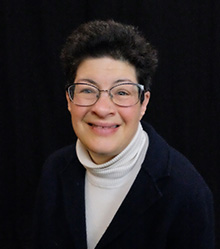Meet the advocate who has shaped Medicaid for people living with disabilities
Liz Weintraub didn’t intend to be a change maker. She just wanted to live her dreams.
Author
- Lindsey Browning
We often talk about the Medicaid program using big numbers: 90 million people served. $700 billion dollars. But big numbers don’t tell the story of the
Medicaid program and what it means to people. They don’t tell the story of how the program has transformed to empower millions of Americans with disabilities and complex health needs to live and thrive in their homes and communities.
This transformation was no accident. It happened because advocates, like Liz Weintraub, worked with policymakers over decades to re-envision how Medicaid can support people as individuals, empowering them to live and thrive in their communities.
Liz Weintraub is a senior advocacy specialist at Association of University Centers on Disability (AUCD) and an individual with lived experience. At NAMD’s Fall Conference, Liz shared how far the nation has come in supporting individuals with disabilities.
“Students [with disabilities] today know exactly what they want. They want a career,” she noted.
But when Liz was growing up, the story was different.
Liz’s parents thought it was only possible for Liz to work in a library. For Liz’s friends, employment wasn’t offered as a possibility by their parents. She had to fight to get out of institution-like settings and to ultimately achieve her dream job, working as a lobbyist. Liz reflected on years working in sheltered workshops, arrangements where employers (who are largely non-profits) receive an exemption from the federal minimum wage laws to employ individuals with disabilities. Liz recalled not knowing how much she was paid while working there. Over the years, she worked in a greenhouse, as a secretary in an office, in a library, and stuffing newspapers. Eventually, Liz made her way into the work of advocacy – her dream job – helping young people advocate for themselves.
She noted, “We have to believe that people with disabilities can do different jobs […] We have to listen to people’s experience and be brave.”
Today, the majority of Medicaid funding for long-term services and supports – more than 60 percent –goes towards making it possible for individuals to live and thrive in their communities, rather than reside in institutions. This includes helping individuals gain and maintain employment. These Medicaid supports are customized to meet a person’s unique needs, which are identified in a person-centered service plan that is co-created by the consumer and serves as a roadmap for care and supports.
While the Medicaid program has made incredible progress, we have a long way to go to deliver on the expectations of the next generation of youth with disabilities. As Liz pointed out, Medicaid programs can do better engaging individuals with lived experience in the policymaking process.
“[Medicaid leaders need to] plan policy with the consumer,” she said.
Other hurdles Medicaid must overcome to deliver on the promise of high-quality, person-centered supports include tackling the nationwide workforce shortage of direct care workers, dated federal regulations that make it difficult to deploy the latest technology to support individuals, and capacity challenges in state government. Medicaid programs are working with their communities to find solutions to these challenges that reflect their unique state context, like enhancing the use of self-directed care models (where the consumer decides by whom and how services are provided), strengthening natural supports (like offering respite care for family caregivers), and in some cases paying family caregivers.
Medicaid has an incredible role to play in helping people, like Liz, live and thrive in their community and have meaningful careers. The Medicaid program can’t, and won’t, back down from the challenges ahead to deliver on this promise. As Liz urged, “open the dream box and think about what’s possible.”

Check out Tuesdays with Liz: Disability Policy for All
Related resources
Kelly Cunningham Q&A: Reflections from Illinois’ Retiring Medicaid Director
Stronger Together: North Dakota Medicaid and Families Partnering for Impact
Stay Informed
Drop us your email and we’ll keep you up-to-date on Medicaid issues.